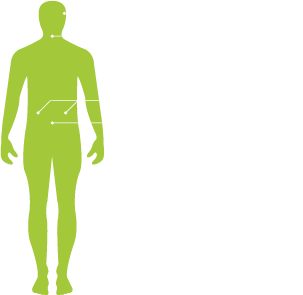Overview
Multiple Endocrine Neoplasia 2A (MEN2A) is a rare autosomal dominant inherited condition causing tumors in multiple endocrine glands, specifically the thyroid, adrenal glands, and parathyroids. There are three main tumor types of MEN 2A: Medullary Thyroid Cancer (MTC), Pheochromocytoma (PHEO) and Parathyroid adenomas/hyperplasia.
You can be diagnosed with MEN2A one of the following ways:
Having 2 of the 3 tumors types (MTC, PHEO, and hyperparathyroidism) in a single patient
Having one tumor type in the patient and a family history of MEN2A and/or family history of the tumor types associated with MEN2A (for example, a patient with MTC whose parent had a PHEO and sibling had hyperparathyroidism)
Genetic testing showing a RET mutation
The first and second are clinical diagnoses and the third is a genetic confirmation of diagnosis. In a small percentage of patients, there can be a clinical diagnosis of MEN2A, but the genetic test is negative. If this happens, you still have MEN2A and should be treated and monitored as such.
Click here for a look at each tumor type, including symptoms and tests.
Click here to read a more in-depth overview of MEN 2A

Procedures and Tests You Will Have
EXAMS AND TESTS
The health care provider will perform a physical exam and ask questions about your medical history and symptoms. The following tests may be done:
For further info please click on the test and procedure.
- Calcitonin
- CT scan of the abdomen (if needed)
- Carcinoembryonic Antigen (CEA)
- (this can also be a marker of MTC )
- Genetic testing
TREATMENT
Surgery to remove the diseased gland is often the treatment of choice. Surgical removal of the thyroid can remove and/or prevent medullary thyroid cancer in those with MEN2A.
The parathyroid glands, which control calcium production, can be removed. However, it is difficult for the body to regulate calcium levels without these glands, so a total parathyroid removal is not done first in most cases.
Hormone replacement therapy is given when entire glands are removed or do not produce enough hormones.
SOURCE: U.S. National Library of Medicine; MedLinePlus
QUESTIONS TO ASK THE DOCTOR:
- Are you familiar with the different types of MEN?
- Are you familiar with all the symptoms, diagnosis and treatment of MEN2A?
- What kind of medical testing will you be performing and where and in what sequence?
- Do you have MEN individuals in you practice at this time?
- Who will be the point person for the results of testing and consultations?
- MEN is a genetic mutation passed from parent to child at a rate of 50/50%/ When should I have my child tested for this genetic mutation?
- Are you willing to spend the time with me and possibility research and treat the symptoms I am having?
- Do you have a network of other specialists that know how to care for an individual with MEN?
- Do you have a treatment plan you follow for MEN individuals?
- Surgeon- Are you a member of American Association of Endocrine Surgeons (AAES)
- Are you familiar with AMENSupport at www.AMENSupport.org
SPECIALISTS YOU WILL NEED:
- Endocrinologist
- Endocrine Surgeon or surgical oncologist ( AAES member)
- Surgical Oncologist
Resources
Click a topic from the list below for more information.
